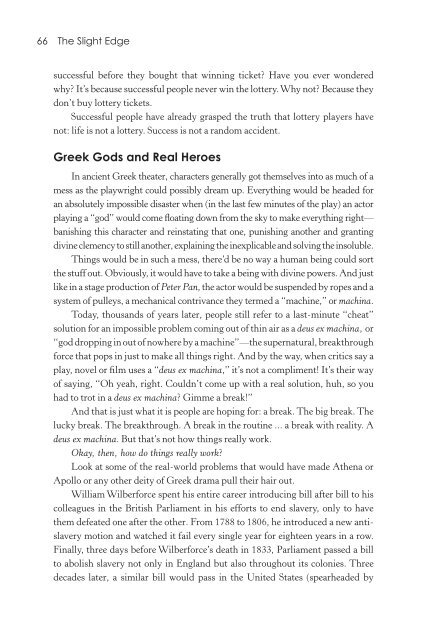The-Slight-Edge
You also want an ePaper? Increase the reach of your titles
YUMPU automatically turns print PDFs into web optimized ePapers that Google loves.
66 <strong>The</strong> <strong>Slight</strong> <strong>Edge</strong><br />
successful before they bought that winning ticket? Have you ever wondered<br />
why? It’s because successful people never win the lottery. Why not? Because they<br />
don’t buy lottery tickets.<br />
Successful people have already grasped the truth that lottery players have<br />
not: life is not a lottery. Success is not a random accident.<br />
Greek Gods and Real Heroes<br />
In ancient Greek theater, characters generally got themselves into as much of a<br />
mess as the playwright could possibly dream up. Everything would be headed for<br />
an absolutely impossible disaster when (in the last few minutes of the play) an actor<br />
playing a “god” would come floating down from the sky to make everything right—<br />
banishing this character and reinstating that one, punishing another and granting<br />
divine clemency to still another, explaining the inexplicable and solving the insoluble.<br />
Things would be in such a mess, there’d be no way a human being could sort<br />
the stuff out. Obviously, it would have to take a being with divine powers. And just<br />
like in a stage production of Peter Pan, the actor would be suspended by ropes and a<br />
system of pulleys, a mechanical contrivance they termed a “machine,” or machina.<br />
Today, thousands of years later, people still refer to a last-minute “cheat”<br />
solution for an impossible problem coming out of thin air as a deus ex machina, or<br />
“god dropping in out of nowhere by a machine”—the supernatural, breakthrough<br />
force that pops in just to make all things right. And by the way, when critics say a<br />
play, novel or film uses a “deus ex machina,” it’s not a compliment! It’s their way<br />
of saying, “Oh yeah, right. Couldn’t come up with a real solution, huh, so you<br />
had to trot in a deus ex machina? Gimme a break!”<br />
And that is just what it is people are hoping for: a break. <strong>The</strong> big break. <strong>The</strong><br />
lucky break. <strong>The</strong> breakthrough. A break in the routine ... a break with reality. A<br />
deus ex machina. But that’s not how things really work.<br />
Okay, then, how do things really work?<br />
Look at some of the real-world problems that would have made Athena or<br />
Apollo or any other deity of Greek drama pull their hair out.<br />
William Wilberforce spent his entire career introducing bill after bill to his<br />
colleagues in the British Parliament in his efforts to end slavery, only to have<br />
them defeated one after the other. From 1788 to 1806, he introduced a new antislavery<br />
motion and watched it fail every single year for eighteen years in a row.<br />
Finally, three days before Wilberforce’s death in 1833, Parliament passed a bill<br />
to abolish slavery not only in England but also throughout its colonies. Three<br />
decades later, a similar bill would pass in the United States (spearheaded by













